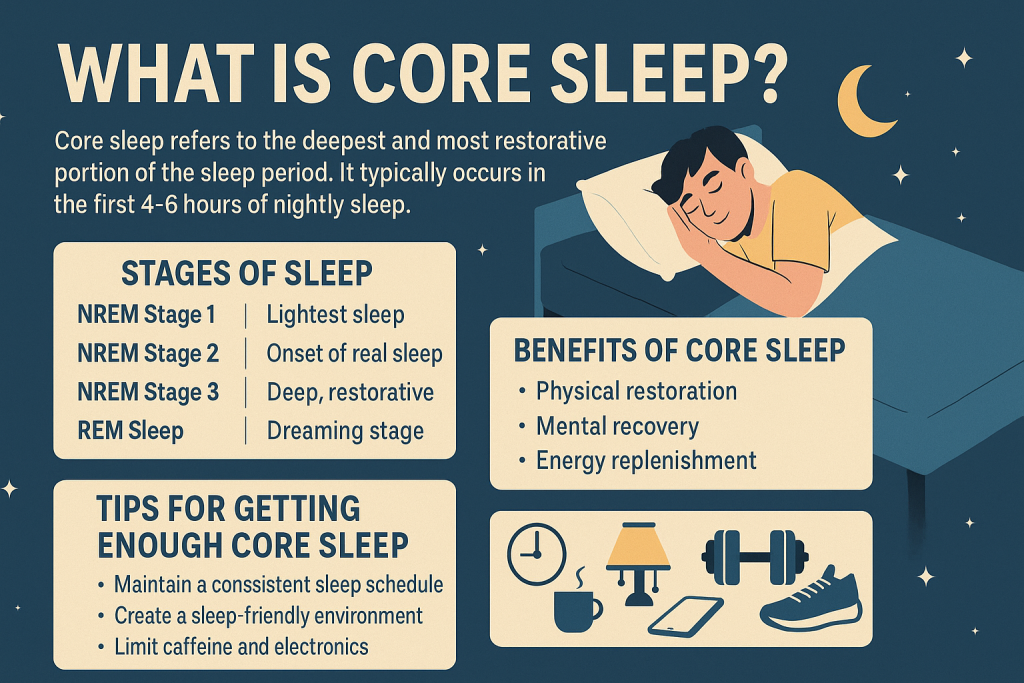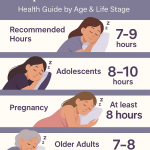Sleep is a fundamental aspect of our health, but not all sleep is created equal. The concept of core sleep has gained attention in recent years, especially within the context of sleep science and polyphasic sleep schedules. But what exactly is core sleep, how does it influence your health, and what can you do to improve it? In this comprehensive guide, we will unravel the meaning of core sleep, explore its stages, and share practical tips to optimize your restorative slumber.
Defining Core Sleep: What Does It Mean?
Core sleep refers to the most essential portion of your nightly rest during which the body undergoes the deepest and most restorative stages of sleep. While the total recommended sleep duration for adults ranges from 7-9 hours, core sleep typically consists of the first 4-6 hours of the sleep period—time when you experience most of your deep sleep (slow wave sleep) and REM (Rapid Eye Movement) sleep cycles.
These stages are crucial for physical restoration, memory consolidation, and emotional processing. The remaining hours of sleep, known as optional sleep or supplemental sleep, tend to be lighter and less restorative but can still benefit cognitive performance and overall energy levels.
Core Sleep in the Context of Polyphasic Sleep
The term core sleep is particularly popular in discussions around polyphasic sleep schedules. Unlike the traditional monophasic sleep schedule (one uninterrupted period at night), polyphasic sleep divides sleep into multiple segments throughout the day.
In popular polyphasic sleep systems, such as the Everyman schedule, the longest sleep block at night is referred to as core sleep, with additional short naps (usually 20-30 minutes) scattered throughout the day to supplement the core period. The idea is that as long as you get enough core sleep—including deep and REM stages—short naps can help maintain cognitive function and alertness.
Is Core Sleep the Same as Deep Sleep?
While core sleep includes deep sleep, it is not synonymous with it. Core sleep encompasses both slow-wave sleep (deep sleep) and a significant portion of REM sleep, both of which are critical for brain health and physical restoration. Deep sleep is generally more concentrated in the early part of the night, whereas REM sleep increases towards the morning.
The Stages of Sleep: Where Does Core Sleep Fit In?
Sleep is divided into several stages that cycle throughout the night:
- NREM Stage 1: Lightest sleep, transition from wakefulness.
- NREM Stage 2: Onset of real sleep, heart rate and temperature drop.
- NREM Stage 3 (Slow Wave Sleep): Deepest, most restorative phase. Tissue repair, cell regeneration, and immune strengthening occur here.
- REM Sleep: Dreaming stage, crucial for memory, learning, and emotional processing.
Core sleep refers to the sleep cycles that contain the highest densities of NREM Stage 3 and REM sleep. Cutting this period short or disrupting it can lead to significant deficits in health and functioning.
Why is Core Sleep So Important?
The benefits of core sleep are profound. During this essential period, your body and mind undergo critical processes:
- Physical Restoration: Muscles and tissues repair, growth hormones are released, and the immune system is strengthened.
- Mental Recovery: Memories are consolidated, learning is enhanced, and emotional regulation is supported.
- Energy Replenishment: The brain detoxifies and reorganizes, helping you wake up refreshed and focused.
- Prevention of Sleep Debt: Consistently getting enough core sleep prevents the accumulation of sleep deprivation, lowering risks for chronic diseases.
What Happens If You Miss Core Sleep?
Missing out on core sleep has immediate and long-term consequences. Short-term lack of core sleep results in grogginess, poor concentration, memory lapses, irritability, and impaired judgment. Chronic core sleep deprivation increases the risk for obesity, diabetes, cardiovascular disease, weakened immunity, depression, and other serious health concerns.
Core Sleep vs. Total Sleep: Is More Always Better?
While it is true that more sleep can be beneficial (especially if you are sleep deprived), it is the quality and composition of your sleep that matter most. You might spend 8-9 hours in bed, but if your sleep is fragmented or you spend too much time in light sleep stages, you may not get sufficient core sleep.
Conversely, some individuals who practice polyphasic sleep and achieve high-quality core sleep supplemented by naps can feel refreshed with less overall sleep. However, this approach should be exercised with caution and is not suitable for everyone.
How to Ensure You Get Enough Core Sleep
Prioritizing core sleep means maximizing the time spent in deep and REM stages. Here are actionable strategies to help you optimize your core sleep:
- Maintain a Consistent Sleep Schedule: Going to bed and waking up at the same time each day anchors your circadian rhythm.
- Create a Sleep-Friendly Environment: Keep your bedroom cool, dark, and quiet. Invest in a comfortable mattress and pillow.
- Limit Caffeine and Electronic Use: Avoid stimulants and blue-light devices before bed as they interfere with natural sleep cycles.
- Establish a Relaxing Bedtime Routine: Wind down with calming activities like reading, light stretching, or meditation.
- Avoid Heavy Meals and Alcohol Before Bed: Both can disrupt deep and REM sleep processes.
- Exercise Regularly: Physical activity during the day can deepen sleep, but avoid vigorous workouts close to bedtime.
Frequently Asked Questions About Core Sleep
How much core sleep do I need?
Most adults need about 4-6 hours of core sleep per night, which is typically achieved within a standard 7-9 hour total sleep window. Individual requirements can vary according to age, genetics, and lifestyle.
Can naps make up for lost core sleep?
Short naps (20-30 minutes) can help improve alertness and mood, but they generally do not provide the deep or REM sleep required for full physical and mental restoration. Extended naps may enter deeper sleep stages, but they can also disrupt nighttime sleep patterns.
Is polyphasic sleeping safe?
While some people adapt to polyphasic schedules, most experts recommend a consolidated period of nighttime sleep to ensure adequate deep and REM sleep. Polyphasic sleep may pose risks, especially if core sleep is consistently shortened.
Conclusion: Make Core Sleep a Priority
Understanding what core sleep is and its critical role in your health empowers you to make informed decisions about your sleep habits. By focusing on quality core sleep—whether you follow a monophasic or polyphasic schedule—you support your body’s need for restoration, emotional resilience, and optimal performance. Prioritize your sleep, and the benefits will follow you throughout your days and nights.


